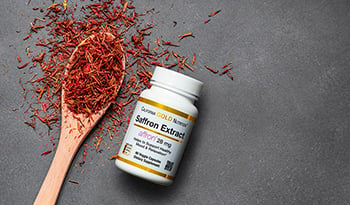5 Best Natural Supplements For Mood

Key Takeaways
- Physiology Matters: Mood is heavily influenced by sleep quality, nutrition, and blood sugar stability.
- Dietary Impact: Flavonoid-rich foods (berries, tea) and omega-3s reduce brain inflammation and may improve mood.
- Top Supplements: Research supports Saffron, 5-HTP, St. John's Wort, PEA, and SAMe as effective natural mood elevators.
- Consistency: Natural remedies typically take 2–6 weeks to show full effects.
What Causes Low Mood? (Stress, Sleep, and Nutrition)
Our mood, the way that we feel, is influenced by two primary factors: our internal focus and our physiology. Internal focus refers to our attitude, the way we explain the events in our lives (e.g., optimism vs. pessimism), and our internal dialogue. Physiology refers to biochemical factors like nutrition, hormones, and brain chemistry, as well as the way that we hold our bodies (posture) and breathe. Even the microbiome, the collection of microbes residing in our gastrointestinal tract, is linked to how we feel.
Sometimes the way we feel is due to temporary circumstances such as a loss of some sort, e.g., death, job, relationship, freedom, etc. It can also be a result of long-term challenges, including health issues, especially those that cause chronic pain. Whether low mood is new or prolonged and persistent, it requires a person to change their internal focus and physiology in order to reset their mood. Often, low mood is the result of nutritional factors that can be addressed effectively through diet and dietary supplements.
Stress and poor sleep quality are two big factors that influence mood. One of the quickest ways to elevate a person’s mood is to improve their sleep quality. Human sleep is perhaps one of the least understood body processes, but its value to human health and proper functioning is without question. Impaired sleep, altered sleep patterns, and sleep deprivation are closely linked to depression and also impair mental and physical function.
The 6 Best Natural Supplements for Sleep: Read more.
Nutrient deficiency, hormonal imbalances, and faulty blood sugar control are other big factors that can lead to mood fluctuations. While the human brain only makes up 2% of our overall body mass, it is the most metabolically active tissue. It requires a steady stream of nutrients, hormones, and other factors to function optimally. A deficiency of any single nutrient can lead to lowered mood scores and mental function, especially deficiencies of vitamin B12, folic acid, other B vitamins, and omega-3 fatty acids.
Additionally, many drugs (prescription, illicit, alcohol, caffeine, nicotine, etc.) can lead to fluctuations and disturbances in mood either directly or through causing nutrient depletion.
How Diet Impacts Mental Health
Food definitely influences how we feel. In particular, since the brain requires a constant supply of blood sugar to function properly, hypoglycemia (low blood sugar) must be avoided. Symptoms of hypoglycemia generally include depression, anxiety, and irritability. Several studies have shown hypoglycemia to be a very common factor contributing to low mood scores.1 Hypoglycemia most often is due to the body’s response to a high sugar meal. Simply eliminating refined carbohydrates and caffeine (which can aggravate hypoglycemia) from the diet is sometimes all that is needed for effective therapy in patients whose low mood results from reactive hypoglycemia.
Beyond hypoglycemia, the structural components, as well as how well the brain functions and our mood, are closely tied to nutritional status. In particular, the importance of omega-3 fatty acids to brain function and mood cannot be overstated. Higher levels of omega-3 fatty acids in the brain are associated with better brain function and a better mood. Over a dozen clinical trials with fish oil supplements supplying the omega-3 fatty acid EPA at a dosage ranging from 1,000 to 2,000 mg daily have shown considerable benefits in improving mood.2,3
Omega-3 fatty acids are critical components of brain cells and also exert anti-depressant effects through their anti-inflammatory effects. The new theory of depression is that it reflects brain inflammation. Dietary factors that reduce inflammation, not surprisingly, have shown benefits in improving mood. For example, there are numerous population-based studies showing increased consumption of flavonoid-rich foods such as tea (both green and black), soyfoods, and flavonoid-rich fruit, especially berries, that exert mood-elevating effects.4,5 And, there is also data that indicates that consumption of flavonoid-rich foods in children is associated with improved mental health in children and adolescents. Specifically, double-blind studies in children and young adults recently showed that drinking a flavonoid-rich wild blueberry drink containing 253 mg anthocyanins produced a significant effect on boosting mood within two hours after ingestion.5 The authors in one of the studies concluded that “…Dietary interventions could play a key role in promoting positive mood and are a possible way to prevent dysphoria and depression…”6
Top 5 Vitamins And Supplements To Boost Mood
Balancing mood takes a comprehensive approach. Developing a positive mental attitude, following a health-promoting lifestyle, optimal nutrition, and the appropriate use of key dietary supplements are the foundational cornerstones of building health, happiness, and well-being in our lives.
It is very important to provide a strong nutritional foundation by taking a high potency multiple vitamin and mineral formula providing at least the recommended dietary intake (RDI) of all vitamins and minerals as well as extra vitamin D3 (2,000-5,000 IU/day), high-quality fish oil that provides EPA+DHA+DPA at a dosage of 1,000 to 2,000 mg/day, and some sort of flavonoid-rich extracts like grape seed or pine bark extract at a dosage of 100 to 300 mg per day. These foundational supplements alone, especially the fish oils, can really boost mood. Beyond these, there are several natural mood boosters with significant scientific support.
1. Saffron: The Natural Antidepressant Alternative
Saffron has emerged as the best herbal approach to boosting mood. Numerous studies have now shown the standardized extract of saffron (Crocus sativus) is a safe and effective natural mood-elevating agent.7-9 Saffron’s mood-elevating effects are due to multiple sites of action. For example, it increases the levels in the brain of important mood-elevating neurotransmitters like serotonin and dopamine. It also modulates the stress response and exerts anti-inflammatory effects in the brain. Several studies show saffron is safe to use with conventional antidepressant drugs and may offset some of their side effects. The typical dosage for saffron extract standardized at 2% safranal is 15 mg twice a day, though some studies used a dosage of 30 mg twice daily. Saffron is definitely the best choice if a person is on a conventional antidepressant drug.
The Health Benefits of Saffron: Read more.
2. 5-HTP: Increasing Serotonin Naturally
5-Hydroxytryptophan (5-HTP) is extracted from the seed of an African plant (Griffonia simplicifolia) and is the direct precursor to serotonin – a key brain chemical that regulates our mood. In addition to increasing serotonin levels, 5-HTP causes an increase in levels of endorphin and other neurotransmitters that boost our mood. Numerous double-blind studies have confirmed this mood-boosting effect.10-12 The typical recommendation is 50 to 100 mg three times daily (best taken before meals, preferably use an “enteric-coated” product or chewable tablet to prevent gastrointestinal upset). 5-HTP is the best choice for people who tend to crave carbohydrates or have significant sleep issues.
5-HTP is Nature’s Best Answer to Boosting Brain Serotonin Levels: Read more.
3. St. John’s Wort: The Traditional Mood Lifter
St. John’s wort extract (Hypericum perforatum) is a very well-known natural mood-elevating agent and has the support of positive results in over 30 double-blind studies.13-15 The dosage for St. John’s wort extract (0.3% hypericin content) is 900 to 1800 mg daily. If you are taking any prescription drugs, check with your doctor or pharmacist before taking St. John’s wort extract, as it appears to induce enzymes in the liver and gut that detoxify certain drugs, including birth control pills, thereby possibly reducing their effectiveness. In severe low mood cases, St. John’s wort extract can be used in combination with 5-HTP.
St. John’s Wort—The Best Supplement For Mood: Read more.
4. Palmitoylethanolamide (PEA): For Mood and Comfort
Palmitoylethanolamide (PEA) is a fatty substance produced in the body that is also available as a dietary supplement. In the brain, PEA functions to balance inflammation and reduce brain cell stress. It has shown mood-elevating effects in a clinical trial where it was given at a dosage of 600 mg twice daily.16 Results showed a mood-boosting effect after only 2 weeks of use. PEA is the best choice if a person is experiencing a lot of physical discomfort as well as a low mood.
A Quick Guide to Palmitoylethanolamide (PEA): Read more.
5. S-adenosylmethionine (SAMe): Supporting Brain Chemistry
S-adenosylmethionine (SAMe) is utilized in the manufacture of many brain compounds, including serotonin and other neurotransmitters. SAMe supplementation has been shown to be useful in improving mood in published clinical trials. Dosage: 200 to 400 mg three times daily. SAMe also exerts beneficial effects on the liver during pregnancy. It may be the best choice for people with low mood who have stress on their liver health due to hormonal imbalance, toxin exposure, or pregnancy.
Lift Your Mood, Lower Your Pain, Light Up Your Brain—Naturally with SAMe: Read more.
When To See A Doctor
Even natural mood elevators generally take 2-6 weeks to demonstrate an effect. One of the first improvements noted by many is in sleep quality. If low mood persists, it may indicate clinical depression, which is usually accompanied by other signs and symptoms:
- Poor appetite accompanied by weight loss or increased appetite accompanied by weight gain
- Insomnia or excessive sleep habits (hypersomnia)
- Physical hyperactivity or inactivity
- Loss of interest or pleasure in usual activities, or a decrease in sexual drive
- Loss of energy; feelings of fatigue
- Feelings of worthlessness, self-reproach, or inappropriate guilt
- Diminished ability to think or concentrate
If you have 5 or more of these symptoms or recurrent thoughts of self-harm, please consult your health care provider.
References:
- Winokur A, Maislin G, Phillips JL, et al. Insulin resistance after oral glucose tolerance testing in patients with major depression. Am J Psychiatry 1988;145:325-330.
- Liao Y, Xie B, Zhang H, et al. Efficacy of omega-3 PUFAs in depression: A meta-analysis. Transl Psychiatry. 2019;9(1):190.
- Jahangard L, Sadeghi A, Ahmadpanah M, et al. Influence of adjuvant omega-3-polyunsaturated fatty acids on depression, sleep, and emotion regulation among outpatients with major depressive disorders - Results from a double-blind, randomized and placebo-controlled clinical trial. J Psychiatr Res. 2018;107:48-56.
- Rothenberg DO, Zhang L. Mechanisms Underlying the Anti-Depressive Effects of Regular Tea Consumption. Nutrients. 2019 Jun 17;11(6):1361.
- Cásedas G, Les F, López V. Anthocyanins: Plant Pigments, Food Ingredients or Therapeutic Agents for the CNS? A Mini-Review Focused on Clinical Trials. Curr Pharm Des. 2020;26(16):1790-1798
- Khalid S, Barfoot KL, May G, et al. Effects of Acute Blueberry Flavonoids on Mood in Children and Young Adults. Nutrients. 2017 Feb 20;9(2). pii: E158. doi: 10.3390/nu9020158.
- Khazdair MR, Boskabady MH, Hosseini M, Rezaee R, M Tsatsakis A. The effects of Crocus sativus (saffron) and its constituents on nervous system: A review. Avicenna J Phytomed. 2015 Sep-Oct;5(5):376-91.
- Shafiee M, Arekhi S, Omranzadeh A, Sahebkar A. Saffron in the treatment of depression, anxiety and other mental disorders: Current evidence and potential mechanisms of action. J Affect Disord. 2018 Feb;227:330-337.
- Hausenblas HA, Heekin K, Mutchie HL, Anton S. A systematic review of randomized controlled trials examining the effectiveness of saffron (Crocus sativus L.) on psychological and behavioral outcomes. J Integr Med. 2015;13(4):231-240.
- Byerley WF, Judd LL, Reimherr FW, et al. 5-Hydroxytryptophan. A review of its antidepressant efficacy and adverse effects. J Clin Psychopharmacol 1987;7:127–137.
- Jangid P, Malik P, Singh P, Sharma M, Gulia AK. Comparative study of efficacy of l-5-hydroxytryptophan and fluoxetine in patients presenting with first depressive episode. Asian J Psychiatr 2013;6(1):29-34.
- Poldinger W, Calanchini B, Schwarz W. A functional-dimensional approach to depression: serotonin deficiency as a target syndrome in a comparison of 5-hydroxytryptophan and fluvoxamine. Psychopathology 1991;24:53–81.
- Ng QX, Venkatanarayanan N, Ho CY. Clinical use of Hypericum perforatum (St John's wort) in depression: A meta-analysis. J Affect Disord. 2017;210:211-221.
- Eatemadnia A, Ansari S, Abedi P, Najar S. The effect of Hypericum perforatum on postmenopausal symptoms and depression: A randomized controlled trial. Complement Ther Med. 2019;45:109-113.
- Singer A, Schmidt M, Hauke W, Stade K. Duration of response after treatment of mild to moderate depression with Hypericum extract STW 3-VI, citalopram and placebo: a reanalysis of data from a controlled clinical trial. Phytomedicine. 2011;18(8-9):739-742.
- Ghazizadeh-Hashemi M, Ghajar A, Shalbafan MR, et al. Palmitoylethanolamide as adjunctive therapy in major depressive disorder: A double-blind, randomized and placebo-controlled trial. J Affect Disord. 2018 May;232:127-133.
- Sharma A, Gerbarg P, Bottiglieri T, et al. S-Adenosylmethionine (SAMe) for Neuropsychiatric Disorders: A Clinician-Oriented Review of Research. J Clin Psychiatry. 2017;78(6):e656-e667.
DISCLAIMER:This Wellness Hub does not intend to provide diagnosis...
















































































 Table of Contents
Table of Contents
















